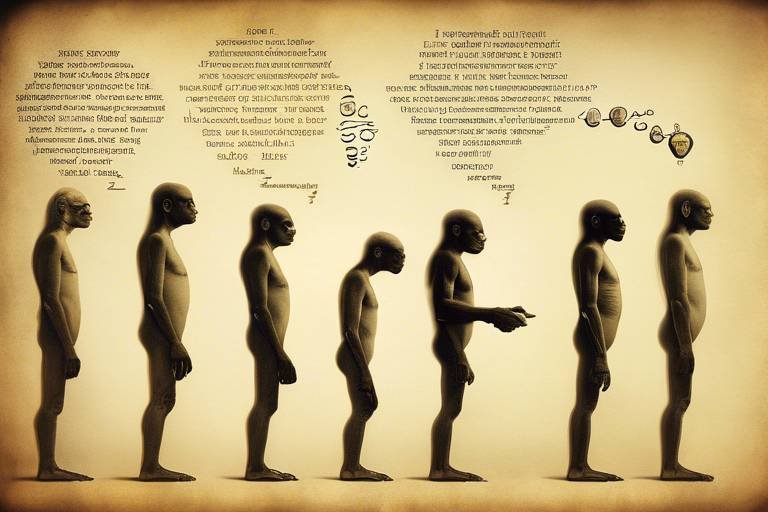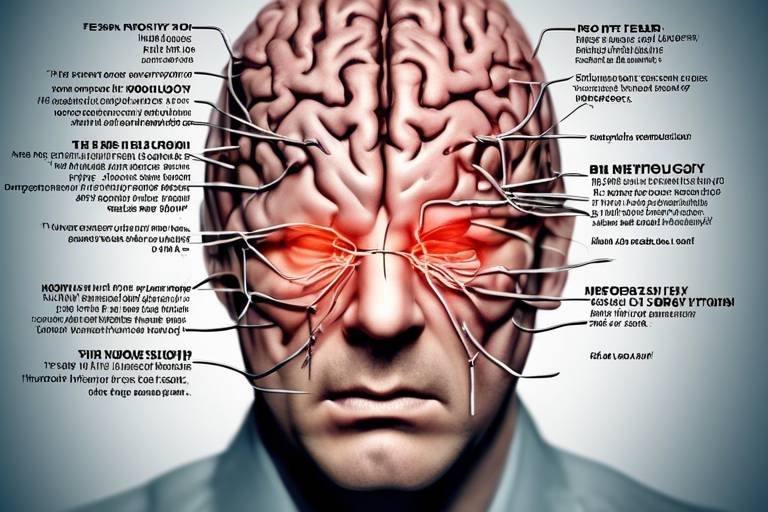Mind-Body Interaction - Deciphering The Intricacies
The relationship between the mind and body is a fascinating tapestry woven with threads of psychology, physiology, and personal experience. Imagine your mind as a conductor, orchestrating the symphony of your body’s responses. Every thought, feeling, and emotion resonates through this intricate connection, influencing everything from your daily energy levels to your long-term health outcomes. This article dives deep into the complexities of mind-body interaction, shedding light on how our psychological states can significantly impact our physical health and vice versa. Understanding this connection is not just an academic exercise; it has profound implications for our personal well-being and overall quality of life.
At its core, the mind-body interaction is about recognizing that our mental and emotional states are not isolated from our physical health. Instead, they are intertwined in a dance that can either promote wellness or contribute to illness. For instance, have you ever noticed how a stressful day at work can lead to a headache or a stomach ache? This phenomenon is not just a coincidence; it’s a clear example of how our mental state can manifest physically. Conversely, maintaining good physical health through exercise and nutrition can enhance our mood and mental clarity. It's a two-way street that deserves our attention and understanding.
As we explore this intricate relationship, we will uncover the theoretical foundations that support the mind-body connection, delve into the psychosomatic connections that highlight the impact of stress and emotions on physical health, and evaluate therapeutic approaches that harness this connection for healing. By the end of this journey, you will not only appreciate the depth of the mind-body interaction but also discover practical ways to enhance your well-being through this understanding.
Understanding the theoretical frameworks that underpin mind-body interaction is crucial for grasping its significance in psychology and medicine. Numerous theories and models explain how our thoughts and feelings can influence our physical health. For instance, the biopsychosocial model emphasizes the interplay between biological, psychological, and social factors in health and illness. This model suggests that our mental state can significantly affect our physical condition, while our physical health can, in turn, influence our mental well-being.
Moreover, theories such as the stress-response theory illustrate how our bodies react to perceived threats, leading to a cascade of physiological changes that can impact health. Recognizing these frameworks helps us understand the profound implications of mind-body interaction, not just in terms of treatment but also in prevention and overall health maintenance.
Psychosomatic disorders illustrate the profound impact of mental states on physical health. The term "psychosomatic" refers to physical symptoms that arise from emotional or psychological factors. Stress, anxiety, and depression can manifest as a variety of physical ailments, from chronic pain to gastrointestinal issues. This underscores the importance of addressing both psychological and physical health in treatment.
Chronic stress can lead to a myriad of health issues, including cardiovascular disease and weakened immunity. When we experience stress, our bodies release hormones like cortisol, which can have detrimental effects on our health if they remain elevated over time. To combat this, stress management techniques such as mindfulness, deep breathing, and yoga can significantly improve overall health outcomes.
Meditation and relaxation methods have been shown to reduce stress and enhance physical health. These techniques not only help in calming the mind but also create a positive impact on the body by lowering blood pressure, improving sleep quality, and boosting the immune system. For individuals seeking relief from stress-related ailments, incorporating these practices into daily routines can be transformative.
Physical activity is a powerful tool for managing stress. Regular exercise releases endorphins, the body’s natural mood lifters, which can help alleviate feelings of anxiety and depression. Whether it’s a brisk walk, a dance class, or a gym session, finding an enjoyable form of exercise can significantly contribute to mental well-being and promote a healthier mind-body connection.
Emotions play a significant role in physical health, influencing everything from immune function to recovery rates. Positive emotions can enhance our immune response, while negative emotions can suppress it. This connection highlights the importance of emotional well-being in maintaining physical health.
Various therapeutic approaches integrate mind-body principles to promote healing. Methods such as cognitive-behavioral therapy (CBT), mindfulness, and holistic practices enhance the mind-body connection. These therapies not only address psychological issues but also consider their physical manifestations, leading to a more comprehensive approach to health.
Mindfulness practices have gained popularity for their ability to foster awareness and reduce stress. By focusing on the present moment, individuals can learn to manage their thoughts and emotions more effectively, leading to improved mental and physical health outcomes. Mindfulness-based interventions are increasingly being incorporated into therapeutic settings, offering a holistic approach to healing.
Cognitive Behavioral Therapy (CBT) focuses on changing negative thought patterns to improve emotional well-being. By addressing these cognitive distortions, CBT can influence physical health outcomes through improved mental states. This therapeutic approach empowers individuals to take control of their thoughts, leading to healthier behaviors and better health overall.
As research into mind-body interaction continues to evolve, new insights and methodologies emerge. Future trends may include a greater emphasis on integrative health practices that combine traditional medicine with mind-body techniques. Advances in technology, such as biofeedback and virtual reality, may also play a role in enhancing our understanding of the mind-body connection and its implications for health.
- What is the mind-body connection? The mind-body connection refers to the relationship between our mental and emotional states and their impact on physical health.
- How does stress affect physical health? Chronic stress can lead to various health issues, including cardiovascular disease, weakened immunity, and digestive problems.
- What are some effective stress management techniques? Techniques such as meditation, deep breathing, exercise, and mindfulness can help manage stress effectively.
- Can emotional health influence physical recovery? Yes, positive emotional states can enhance recovery rates and improve immune function.
- What role does therapy play in mind-body interaction? Therapeutic approaches like CBT and mindfulness integrate mind-body principles to promote holistic healing.

Theoretical Foundations
Understanding the theoretical frameworks that underpin mind-body interaction is crucial for grasping its significance in psychology and medicine. At its core, the relationship between the mind and body is a complex dance, where mental states can profoundly influence physical health and vice versa. Several key theories and models help to illuminate this intricate connection.
One prominent theory is the Biopsychosocial Model, which posits that health and illness are products of a combination of biological, psychological, and social factors. This model suggests that our physical health is not merely a result of our biological makeup but is also significantly influenced by our thoughts, emotions, and social interactions. For instance, consider how a supportive social network can bolster an individual’s resilience against stress, ultimately leading to better health outcomes.
Another essential framework is the Mind-Body Dualism, famously articulated by René Descartes. Descartes proposed that the mind and body are distinct entities that interact with each other. This perspective has laid the groundwork for much of modern psychology and medicine, prompting further exploration into how mental states can affect physical conditions. However, contemporary views often lean towards a more integrated approach, recognizing that the mind and body are not just separate but are deeply interconnected.
Moreover, the Psychoneuroimmunology field investigates how psychological processes, the nervous system, and the immune system interact. It provides compelling evidence that stress and emotional states can lead to changes in immune function, influencing susceptibility to illness. For example, chronic stress can weaken the immune response, making individuals more vulnerable to infections. This highlights the importance of addressing psychological well-being as part of a comprehensive health strategy.
To further understand these theories, let’s break down some key components of mind-body interaction:
- Psychological Factors: These include emotions, thoughts, and behaviors that can influence physical health.
- Biological Factors: Genetic predispositions and physiological responses that affect how we experience health and illness.
- Social Factors: The impact of relationships, cultural contexts, and socioeconomic status on health outcomes.
In summary, the theoretical foundations of mind-body interaction provide a robust framework for understanding how our mental and physical health are intertwined. By recognizing the importance of both psychological and physiological factors, we can better appreciate the complexities of health and develop more effective treatment approaches.

Psychosomatic Connections
The intricate dance between the mind and body is beautifully illustrated through the lens of psychosomatic disorders. These conditions serve as a vivid reminder that our mental states can profoundly impact our physical health. Imagine your mind as a conductor, orchestrating a symphony of bodily functions. When the conductor is in tune, everything flows harmoniously. However, when stress, anxiety, or negative emotions take center stage, the entire performance can go off-key, leading to a cacophony of physical symptoms.
Psychosomatic disorders manifest in various ways, often presenting as physical ailments that have no identifiable medical cause. For instance, someone under immense stress might experience chronic headaches, digestive issues, or even unexplained pain. It's as if the body is sending out an alarm signal, desperately trying to communicate that something is amiss in the mental realm. This connection underscores the necessity for a holistic approach to health—one that acknowledges the interplay between our thoughts, feelings, and physical well-being.
To further illustrate this connection, consider the following common psychosomatic symptoms:
- Headaches: Often triggered by stress or emotional turmoil.
- Gastrointestinal issues: Anxiety can lead to problems like irritable bowel syndrome (IBS).
- Chronic pain: Emotional distress can exacerbate conditions like fibromyalgia.
Addressing psychosomatic issues requires a dual approach that focuses on both the mind and body. Traditional medical treatments may alleviate physical symptoms, but without addressing the underlying emotional or psychological factors, these symptoms may persist or even resurface. This is where a comprehensive treatment plan becomes essential, integrating both psychological support and physical health interventions.
Incorporating practices such as mindfulness meditation, therapy, and stress management techniques can create a more balanced state of being. For example, mindfulness helps individuals become more aware of their thoughts and feelings, allowing them to process emotions in a healthier way. This not only aids in reducing stress but also has a positive ripple effect on physical health.
Ultimately, understanding the psychosomatic connection empowers individuals to take charge of their health. By recognizing that mental and physical health are intertwined, we can foster a more profound sense of well-being. It's about tuning into our bodies and minds, listening to the signals they send, and responding with compassion and care.

Stress and Health
Stress is like that uninvited guest who overstays their welcome at a party; it creeps in quietly, and before you know it, it’s wreaking havoc on your health. Chronic stress can lead to a plethora of health issues, and understanding this connection is crucial for anyone looking to maintain their well-being. When we experience stress, our body releases a cocktail of hormones, including cortisol and adrenaline, which can trigger a fight or flight response. While this reaction is helpful in short bursts, prolonged exposure can lead to serious complications.
Imagine your body as a finely tuned machine. When stress levels rise, it's as if someone has thrown a wrench into the gears. Over time, this can result in various health problems, such as:
- Cardiovascular Disease: High stress can lead to increased heart rate and blood pressure, making your heart work overtime.
- Weakened Immune System: Chronic stress can suppress the immune response, leaving you more susceptible to illness.
- Digestive Issues: Stress can disrupt the normal functioning of your digestive system, leading to conditions like irritable bowel syndrome (IBS).
- Mental Health Disorders: Anxiety and depression can be exacerbated by ongoing stress, creating a vicious cycle.
To combat these stress-related health issues, it’s essential to adopt effective stress management techniques. Here are some strategies that can help:
| Technique | Description | Benefits |
|---|---|---|
| Meditation | A practice that involves focusing the mind to achieve a state of calm. | Reduces anxiety, enhances emotional well-being. |
| Deep Breathing | Focusing on slow, deep breaths to calm the mind. | Helps lower heart rate, reduces stress hormones. |
| Yoga | A physical, mental, and spiritual practice that combines postures, breathing, and meditation. | Improves flexibility, reduces tension, promotes relaxation. |
Incorporating these techniques into your daily routine can significantly improve your overall health. Just like a gardener tends to their plants to ensure they flourish, you too must nurture your mental health to maintain a healthy body. Remember, the mind and body are intricately linked, and taking steps to manage stress effectively can lead to a happier, healthier life.
- What are the signs of chronic stress? Chronic stress can manifest as fatigue, irritability, difficulty concentrating, and physical symptoms like headaches or stomach issues.
- How can I measure my stress levels? While there is no definitive test, monitoring your mood, sleep patterns, and physical symptoms can provide insight into your stress levels.
- Is it possible to eliminate stress completely? While it's unrealistic to eliminate stress entirely, you can manage and reduce it through various techniques.

Meditation and Relaxation Techniques
Meditation and relaxation techniques have emerged as powerful allies in the quest for better health and well-being. Imagine your mind as a cluttered room; meditation acts as a broom, sweeping away the dust and chaos, allowing clarity and peace to shine through. These practices not only calm the mind but also create a ripple effect on the body, promoting healing and resilience. The beauty of meditation lies in its simplicity; you don’t need any special equipment or a luxurious setting. Just a quiet space and a few moments of your time can transport you to a place of tranquility.
One of the most compelling aspects of meditation is its ability to reduce stress levels significantly. When we meditate, we activate the body's relaxation response, which contrasts sharply with the fight-or-flight response triggered by stress. This shift can lead to lower blood pressure, improved digestion, and enhanced immune function. It's like giving your body a mini-vacation from the hustle and bustle of daily life. Furthermore, studies have shown that regular meditation can lead to lasting changes in brain structure, enhancing areas associated with emotional regulation and self-awareness.
There are various forms of meditation to explore, each with its unique benefits. For instance, mindfulness meditation encourages you to focus on the present moment, enhancing your awareness of thoughts and feelings without judgment. On the other hand, loving-kindness meditation fosters compassion and empathy, not just towards yourself but also towards others. Here’s a quick overview of some popular meditation techniques:
| Technique | Description | Benefits |
|---|---|---|
| Mindfulness Meditation | Focusing on the present moment and observing thoughts and feelings. | Improved focus, reduced anxiety, enhanced emotional regulation. |
| Loving-Kindness Meditation | Sending goodwill and kindness to oneself and others. | Increased feelings of compassion, reduced negative emotions. |
| Transcendental Meditation | Using a mantra to settle the mind into profound rest. | Stress reduction, improved overall well-being, enhanced creativity. |
Incorporating relaxation techniques such as deep breathing, progressive muscle relaxation, or guided imagery can further enhance the benefits of meditation. These methods help in calming the nervous system and promoting a sense of safety and comfort. For instance, deep breathing—often overlooked—can be a game-changer. By taking slow, deep breaths, you can activate your body's relaxation response, reducing cortisol levels and promoting a sense of calm. It’s like hitting the reset button on your day.
In conclusion, meditation and relaxation techniques are not just trendy buzzwords; they are essential tools in fostering a healthy mind-body connection. By dedicating just a few minutes each day to these practices, you can significantly improve your mental clarity, emotional stability, and physical health. So, why not give it a try? Your mind and body will thank you.
- How long should I meditate each day? Start with just 5-10 minutes and gradually increase as you become more comfortable.
- Can meditation help with anxiety? Yes, many studies indicate that meditation can significantly reduce anxiety levels.
- Do I need to sit cross-legged to meditate? No, you can meditate in any comfortable position that allows you to focus.
- What if I can’t stop my thoughts while meditating? It’s normal! Acknowledge them and gently bring your focus back to your breath or mantra.

Exercise as a Stress Reliever
When it comes to managing stress, one of the most effective and enjoyable methods is exercise. You might be wondering, how can something that requires effort and energy actually help relieve stress? Well, think of exercise as a natural antidote to the pressures of daily life. Just like a pressure cooker releases steam to prevent an explosion, physical activity allows your body and mind to release built-up tension.
Engaging in regular physical activity triggers the release of endorphins, often referred to as the body's feel-good hormones. These chemicals interact with the receptors in your brain, reducing the perception of pain and boosting your mood. It’s like giving your brain a warm hug! Whether it's a brisk walk, a dance class, or a rigorous workout, the movement helps to clear your mind and provides a sense of accomplishment.
But the benefits of exercise extend beyond just the immediate release of stress. Over time, consistent physical activity can lead to improved resilience against stress. Imagine building a fortress; each workout adds another layer of protection against the worries and anxieties of life. Regular exercise can enhance your overall mental health, improve sleep quality, and increase your energy levels, all of which are crucial for maintaining a balanced and healthy lifestyle.
Here are some key ways exercise acts as a stress reliever:
- Reduces Tension: Physical activity helps to relax the muscles and relieve tension in the body, which can lead to a decrease in physical symptoms of stress.
- Boosts Self-Confidence: Achieving fitness goals, no matter how small, can enhance your self-esteem and provide a sense of control, countering feelings of helplessness that stress can induce.
- Social Interaction: Joining a class or sports team can foster connections with others, providing social support that can buffer against stress.
Incorporating exercise into your daily routine doesn’t have to be a chore. Start small! You could try taking the stairs instead of the elevator, going for a short walk during your lunch break, or even dancing in your living room. The key is to find activities that you enjoy, as this will make it easier to stick with them long-term.
Moreover, consider the type of exercise you engage in. Activities such as yoga or tai chi not only promote physical fitness but also incorporate mindfulness, further enhancing the mind-body connection. These practices encourage you to focus on your breath and movements, which can be incredibly grounding during stressful times.
In conclusion, exercise is more than just a way to stay fit; it's a powerful tool for managing stress and enhancing mental well-being. So, the next time you feel overwhelmed, consider lacing up your sneakers and heading out for a run or a walk. Your mind and body will thank you!
- How often should I exercise to relieve stress? Aim for at least 30 minutes of moderate exercise most days of the week. Consistency is key!
- Can any type of exercise help with stress relief? Yes! Whether it's aerobic, strength training, or flexibility exercises, all forms of physical activity can help reduce stress.
- What if I don’t have time to exercise? Even short bursts of activity, like a quick 10-minute walk, can be effective in managing stress.

Emotional Influences on Health
When we talk about health, it’s easy to focus solely on the physical aspects—diet, exercise, and sleep. But have you ever stopped to think about how your emotions play a pivotal role in your overall health? Just like a delicate dance, our emotions and physical health are intricately intertwined, often influencing one another in profound ways. Studies show that negative emotions such as stress, anxiety, and depression can have tangible effects on our bodies, leading to issues like weakened immunity, chronic pain, and even cardiovascular diseases. On the flip side, positive emotions can enhance our well-being and promote healing.
Consider this: when you experience joy, your body releases endorphins, which are natural painkillers, and serotonin, which helps regulate mood. Conversely, prolonged periods of sadness or stress can lead to physical symptoms, manifesting in ways that might surprise you. For instance, have you ever felt your stomach churn before a big presentation? That’s your body responding to emotional stress!
In fact, researchers have identified several key emotional influences on health, including:
- Immune Function: Emotions can significantly impact the immune system. Negative emotions can suppress immune responses, making us more susceptible to illness.
- Recovery Rates: Patients with a positive outlook often recover faster from surgeries and illnesses compared to those with a pessimistic view.
- Chronic Conditions: Conditions like heart disease and diabetes can be exacerbated by stress and emotional turmoil.
To illustrate this connection further, let’s take a look at a simple table that summarizes the relationship between emotional states and health outcomes:
| Emotional State | Health Impact |
|---|---|
| Positive Emotions | Enhanced immune function, faster recovery, lower risk of chronic diseases |
| Negative Emotions | Weakened immunity, increased risk of chronic pain, cardiovascular issues |
So, what can we do about this? It’s essential to cultivate emotional well-being as part of our health regimen. Techniques such as mindfulness meditation, journaling, and even talking to a trusted friend can help us manage our emotions effectively. By doing so, we not only improve our mental state but also enhance our physical health. It’s like planting a garden; when you nurture the soil (your mind), the flowers (your body) bloom beautifully.
In conclusion, it’s clear that our emotions are not just fleeting feelings; they are powerful forces that can shape our health outcomes. By paying attention to our emotional well-being, we can take proactive steps towards achieving a healthier, more balanced life.
- How do emotions affect physical health? Emotions can influence various bodily functions, including immune response and recovery rates, leading to either positive or negative health outcomes.
- What are some ways to improve emotional well-being? Techniques such as mindfulness, exercise, and social support can significantly enhance emotional health.
- Can positive thinking really improve health? Yes! Positive emotions can boost immune function and promote faster recovery from illnesses.

Therapeutic Approaches
The intricate relationship between the mind and body has led to the development of various therapeutic approaches that aim to promote healing by integrating both psychological and physical aspects. These methods not only address symptoms but also focus on the root causes of health issues, offering a holistic way to improve overall well-being. Imagine your body as a finely tuned orchestra; when one instrument is out of sync, the entire symphony is affected. This is the essence of mind-body therapies—striving for harmony.
One of the most prominent approaches is mindfulness-based interventions. These practices encourage individuals to cultivate a heightened awareness of their thoughts, feelings, and bodily sensations. By fostering a non-judgmental attitude towards their experiences, people can learn to manage stress and anxiety more effectively. Research has shown that mindfulness can lead to significant improvements in both mental and physical health, making it a valuable tool in therapeutic settings. For instance, studies indicate that mindfulness practices can:
- Reduce symptoms of anxiety and depression
- Enhance emotional regulation
- Improve sleep quality
- Lower blood pressure
Another effective therapeutic approach is Cognitive Behavioral Therapy (CBT). This method focuses on identifying and changing negative thought patterns that contribute to emotional distress. By restructuring these thoughts, individuals can experience profound shifts in their mental state, which in turn can positively impact their physical health. For example, someone suffering from chronic pain may find relief not just through medication but by altering their perception of pain and developing coping strategies through CBT.
Furthermore, holistic practices are gaining traction as they emphasize the interconnectedness of the mind and body. Techniques such as acupuncture, yoga, and tai chi have shown promising results in enhancing the mind-body connection. These practices not only promote physical fitness but also foster mental clarity and emotional stability. They serve as a reminder that our bodies are not separate from our minds; rather, they are two sides of the same coin, working in tandem to achieve optimal health.
As we delve deeper into these therapeutic approaches, it becomes clear that the future of healthcare may very well hinge on our understanding of the mind-body connection. By embracing these integrative methods, we can pave the way for a more comprehensive approach to health that prioritizes both mental and physical well-being.
Q: What are mind-body therapies?
A: Mind-body therapies encompass a range of practices that aim to enhance the connection between mental and physical health, such as mindfulness, yoga, and cognitive behavioral therapy.
Q: How can mindfulness improve my health?
A: Mindfulness can help reduce stress, improve emotional regulation, enhance focus, and even lower blood pressure, contributing to overall better health.
Q: Is Cognitive Behavioral Therapy effective for physical health issues?
A: Yes, CBT can be effective for physical health issues by changing negative thought patterns that may exacerbate conditions such as chronic pain or anxiety.
Q: What holistic practices can I try?
A: You can explore practices like yoga, tai chi, acupuncture, and meditation to improve both your mental and physical health.

Mindfulness-Based Interventions
Mindfulness-based interventions (MBIs) have surged in popularity over the past few decades, becoming a beacon of hope for many seeking to navigate the tumultuous waters of modern life. But what exactly are these interventions? In simple terms, MBIs involve practices that cultivate a heightened awareness of the present moment, encouraging individuals to observe their thoughts and feelings without judgment. Imagine standing on the shore, watching the waves roll in and out; this is akin to how mindfulness allows you to observe your mental landscape, acknowledging each thought as it comes and goes.
The beauty of mindfulness lies in its versatility. It's not just a one-size-fits-all approach; rather, it can be tailored to suit individual needs and preferences. Some of the most common forms of MBIs include:
- Mindfulness-Based Stress Reduction (MBSR): Developed by Dr. Jon Kabat-Zinn, MBSR combines mindfulness meditation and yoga to help individuals manage stress and improve overall well-being.
- Mindfulness-Based Cognitive Therapy (MBCT): This approach integrates cognitive behavioral techniques with mindfulness strategies, particularly beneficial for individuals with recurrent depression.
- Mindful Self-Compassion (MSC): Created by Dr. Kristin Neff and Dr. Christopher Germer, MSC focuses on developing self-kindness and compassion through mindfulness practices.
Research has shown that these interventions can lead to significant improvements in both mental and physical health. For instance, studies indicate that individuals who regularly practice mindfulness report lower levels of anxiety and depression. But that's not all; the benefits extend beyond the mind. Physical health outcomes, such as reduced blood pressure and improved immune function, have also been linked to consistent mindfulness practice. It's as though the mind and body are engaged in a constant dialogue, each influencing the other in profound ways.
One of the most appealing aspects of MBIs is their accessibility. You don’t need to be a yogi or meditate for hours on end to reap the benefits. Even short, daily practices can make a substantial difference. For example, spending just a few minutes each day focusing on your breath can ground you, helping to alleviate stress and anxiety. Think of it as a mental reset button, allowing you to approach life's challenges with a clearer, more focused mind.
As we delve deeper into the realm of mindfulness, it's essential to recognize that the journey is personal. Each person's experience with mindfulness will differ, shaped by their unique circumstances and perspectives. Therefore, it's crucial to approach these practices with an open heart and mind, allowing yourself the space to grow and evolve. The key is not perfection but rather progress; even small steps can lead to significant changes over time.
In therapeutic settings, MBIs are increasingly being integrated into treatment plans for various conditions, including anxiety disorders, chronic pain, and even addiction. Mental health professionals are discovering that equipping clients with mindfulness tools can enhance their resilience and coping strategies. Imagine being handed a toolkit filled with resources to help you navigate the storms of life—this is what mindfulness offers.
In conclusion, mindfulness-based interventions represent a powerful fusion of ancient wisdom and modern psychology. By fostering awareness and acceptance, these practices empower individuals to take charge of their mental and physical health. So, whether you're a seasoned practitioner or just dipping your toes into the waters of mindfulness, remember that every moment spent in awareness is a step towards a healthier, more balanced life.
What is mindfulness?
Mindfulness is the practice of being fully present and engaged in the moment, without judgment. It involves observing your thoughts and feelings while maintaining a sense of awareness.
How can mindfulness help with stress?
Mindfulness helps reduce stress by promoting relaxation and awareness, allowing individuals to respond to stressors more effectively rather than react impulsively.
Do I need to meditate for long periods to experience benefits?
No, even short, consistent mindfulness practices can yield significant benefits. Just a few minutes a day can help improve your mental clarity and emotional well-being.
Can mindfulness be used in therapy?
Absolutely! Many therapists incorporate mindfulness techniques into their practice to help clients manage anxiety, depression, and other mental health conditions.

Cognitive Behavioral Therapy
Cognitive Behavioral Therapy, commonly known as CBT, is a powerful psychological approach that focuses on the intricate relationship between our thoughts, feelings, and behaviors. Imagine your mind as a complex web where each thought triggers an emotional response, which in turn influences your actions. CBT helps individuals untangle this web by identifying negative thought patterns and replacing them with more constructive ones. This process not only enhances emotional well-being but also has profound implications for physical health.
One of the most significant aspects of CBT is its emphasis on self-awareness. By becoming aware of our thought processes, we can recognize how they affect our emotional state and, subsequently, our physical health. For instance, a person who constantly thinks, "I'm not good enough," may experience feelings of anxiety or depression, which can lead to physical symptoms like fatigue or headaches. CBT teaches individuals to challenge these negative thoughts and replace them with positive affirmations, leading to improved mental and physical health.
Research has shown that CBT can be particularly effective in treating a variety of conditions, including anxiety disorders, depression, and even chronic pain. For example, individuals suffering from chronic pain often find that their mental state exacerbates their physical symptoms. By employing CBT techniques, they can learn to manage their thoughts and emotions, which can lead to a reduction in pain perception. The table below summarizes some of the key benefits of CBT:
| Benefit | Description |
|---|---|
| Improved Emotional Regulation | CBT helps individuals manage their emotions more effectively, leading to reduced anxiety and depression. |
| Enhanced Problem-Solving Skills | Individuals learn to approach problems with a constructive mindset, improving their overall coping strategies. |
| Reduction in Physical Symptoms | By addressing negative thought patterns, individuals may experience a decrease in stress-related physical symptoms. |
| Long-Term Benefits | CBT equips individuals with tools that can be used long after therapy has ended, promoting lasting change. |
Furthermore, CBT is often tailored to meet the unique needs of each individual, making it a versatile treatment option. Therapists may use various techniques, such as exposure therapy for anxiety or behavioral activation for depression, to address specific issues. This personalized approach ensures that clients receive the most effective treatment for their circumstances.
In conclusion, Cognitive Behavioral Therapy is more than just a psychological treatment; it's a transformative process that empowers individuals to take control of their thoughts and emotions. By fostering a healthier mind-body connection, CBT not only enhances mental well-being but also contributes to improved physical health outcomes. So, if you've ever felt trapped in a cycle of negative thoughts and emotions, CBT might just be the key to breaking free.
- What is Cognitive Behavioral Therapy?
CBT is a type of psychotherapy that helps individuals understand and change their thought patterns to improve emotional well-being and physical health. - How long does CBT take to show results?
The duration varies, but many individuals start to see improvements within a few weeks of consistent therapy. - Is CBT effective for physical health issues?
Yes, studies have shown that CBT can help manage chronic pain and stress-related physical symptoms by addressing underlying thought patterns. - Can I practice CBT techniques on my own?
While working with a therapist is beneficial, many CBT techniques can be practiced independently through self-help resources.

Future Directions
The exploration of the mind-body interaction is an ever-evolving field, rich with potential for new discoveries and applications. As we delve deeper into understanding how our thoughts and emotions impact our physical health, several future directions are emerging that promise to enhance our grasp of this intricate relationship. One of the most exciting prospects is the integration of advanced technologies, such as neuroimaging and biometrics, which allow us to visualize and measure the physiological effects of psychological states in real-time.
Additionally, interdisciplinary approaches are gaining traction. By combining insights from psychology, neuroscience, and even quantum physics, researchers can develop a more holistic understanding of how the mind and body interact. For instance, the field of psychoneuroimmunology is gaining momentum, focusing on how psychological factors influence the immune system. This could lead to innovative treatments that not only address symptoms but also target the underlying emotional and psychological issues contributing to physical ailments.
Moreover, there's an increasing recognition of the importance of personalized medicine in the context of mind-body interactions. As we gather more data on individual responses to stress and emotional well-being, healthcare providers can tailor interventions that suit the unique needs of each patient. This could include customized mindfulness practices, exercise regimens, and dietary recommendations aimed at enhancing both mental and physical health.
Another promising direction is the rise of digital health solutions, such as mobile applications and online therapy platforms. These tools can help individuals monitor their mental health, practice relaxation techniques, and access therapeutic resources from the comfort of their homes. This democratization of mental health care can lead to greater accessibility and adherence to treatment plans, ultimately fostering a stronger mind-body connection.
To summarize, the future of mind-body interaction research is bright and filled with possibilities. As we continue to uncover the complexities of this relationship, we can expect to see significant advancements in both our understanding and our ability to harness this knowledge for improved health outcomes. The collaboration between various disciplines, the advent of technology, and a personalized approach to treatment will undoubtedly pave the way for a healthier future.
- What is mind-body interaction?
Mind-body interaction refers to the complex relationship between our mental states and physical health, where psychological factors can influence bodily functions and vice versa. - How can stress affect my physical health?
Chronic stress can lead to various health issues, including heart disease, digestive problems, and weakened immunity, making it essential to manage stress effectively. - What are some effective techniques for improving mind-body connection?
Techniques such as meditation, mindfulness, and regular exercise have been shown to enhance the mind-body connection and promote overall well-being. - Is personalized medicine important in treating mind-body issues?
Yes, personalized medicine allows for tailored treatments that consider an individual's unique psychological and physical health needs, leading to better outcomes.
Frequently Asked Questions
- What is mind-body interaction?
Mind-body interaction refers to the complex relationship between our mental states and physical health. It explores how emotions, thoughts, and psychological conditions can influence bodily functions and vice versa. Essentially, it’s the idea that what happens in your mind can significantly affect your body, and what happens in your body can influence your mind.
- How do psychological states affect physical health?
Psychological states can impact physical health in numerous ways. For example, chronic stress can lead to physical symptoms like headaches, digestive issues, and even cardiovascular problems. When we experience negative emotions or high levels of stress, our body's response can manifest as various health issues, highlighting the importance of mental well-being for overall health.
- What are psychosomatic disorders?
Psychosomatic disorders are conditions where psychological factors significantly contribute to physical symptoms. This means that emotional distress can lead to real, tangible health problems. For instance, someone under severe stress might develop stomach ulcers or chronic pain, demonstrating the profound connection between mind and body.
- How can stress management improve health?
Stress management techniques, such as meditation, deep breathing, and physical exercise, can greatly enhance overall health. By reducing stress levels, these practices can lower the risk of stress-related illnesses, improve immune function, and promote a sense of well-being, making it easier for the body to heal and function optimally.
- What role does exercise play in mental well-being?
Exercise is not just good for the body; it’s a powerful tool for mental health as well. Engaging in regular physical activity releases endorphins, which are natural mood lifters. It helps alleviate anxiety, reduce symptoms of depression, and enhance overall emotional resilience, making it a key component of a healthy mind-body connection.
- What are mindfulness-based interventions?
Mindfulness-based interventions involve practices that promote awareness of the present moment, helping individuals manage stress and improve emotional health. Techniques like meditation, yoga, and mindful breathing can lead to better mental clarity, reduced anxiety, and even improved physical health outcomes, making them valuable tools in therapeutic settings.
- How does Cognitive Behavioral Therapy (CBT) work?
Cognitive Behavioral Therapy (CBT) focuses on identifying and changing negative thought patterns that affect emotions and behaviors. By addressing these cognitive distortions, CBT can lead to improved emotional well-being, which in turn can positively impact physical health, as a healthier mindset often translates to better physical outcomes.
- What are the future directions for mind-body research?
Future research in mind-body interaction is likely to explore new methodologies and technologies to better understand this connection. As we continue to uncover the nuances of how mental and physical health influence each other, we may see advancements in treatment approaches, personalized therapies, and a greater emphasis on holistic health practices that integrate both mind and body for optimal well-being.



















